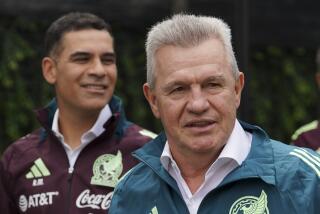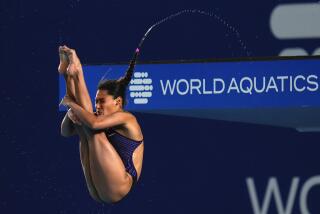China trainers boost Mexico Olympic diving to another level
- Share via
MEXICO CITY — The first time Mexico’s star Olympic diver Paola Espinosa met her Chinese coach, it was more than language that put them on opposite sides of the springboard.
Ma Jin had a totally different approach to diving, Espinosa recalled.
“As Mexicans, we do a lot from the heart,” Espinosa said. Ma, on the other hand, was all about technique, precision and strength. “She had another culture, different customs.”
The year of that first encounter was 2005, and over time Espinosa leaped from being one of Mexico’s many good divers to a world champion ranked among the top five female divers on the planet.
China has made numerous inroads in Latin America, mostly in pursuit of the continent’s raw materials and growing consumer markets. Less publicized have been the cultural infusions like the teaching of Chinese languages, the deployment of hundreds of Chinese journalists and educational exchange programs.
Bringing Ma from China was part of a scheme in the early 2000s to overhaul Mexico’s overly centralized system of training athletes, said Nelson Vargas, the former head of the National Sports Commission who was the mastermind behind the effort. In 2002, Mexico signed a deal with Beijing to import 50 Chinese coaches.
Vargas said the Chinese coaches helped revolutionize athletics in Mexico, especially diving. Divers shined in Mexico’s otherwise lackluster performance at London 2012, earning three of Mexico’s seven medals, including Espinosa’s silver in synchronized diving.
The problem, Vargas said, is that Mexico had lagged in the training of its trainers. For decades, sports was virtually monopolized by the Mexican Olympic Committee, which limited resources to a small number of favored athletes, Vargas and other critics said.
In the last decade, however, the spoils have been better dispersed. Divers, for example, were given their own well-appointed complex in southern Mexico City for practice and workouts. This year, the government of President Felipe Calderon budgeted a stunning $450 million to the sports commission, more than five times that of previous years.
And, following the Chinese model, Mexican athletics officials started recruiting younger athletes. (Two of the most promising divers now are 15-year-old girls.)
“I always thought that to succeed, we needed to do more like the Chinese,” Vargas said. “It’s about giving 100%, body and soul. We needed to learn to pay that price. That level of sacrifice.”
Mexico was already strong in diving. (And not because of those famous cliffs in Acapulco where daring kids plunge to the water many long yards below. Those are mostly poor kids, and Olympic coaches do not come knocking on their doors.)
Diving great Joaquin Capilla began winning Olympic medals for Mexico in 1948, and he and a few more who followed appealed to young Mexicans to dedicate themselves to the discipline. Today there are six training centers for top-flight divers across the country. The sport has won more Olympic medals for Mexico than any other, tied only with boxing.
Bernardo de la Garza, current head of the sports commission, said the Chinese and other foreign coaches, along with important wins internationally across a variety of disciplines, have helped Mexican athletes overcome a “lack of confidence … where we limited ourselves.”
He praised Espinosa as the greatest female diver in Mexican history, noting that Ma helped her “polish her technique” and balance “dreams and commitments.”
“Mexico is steadily improving” in international sports competitions, De la Garza said. “We are seeing a positive transformation that is tangible. It’s a change of mentality. Sports speaks well of Mexico.”
Espinosa said Ma gave her a new respect for technique and discipline. Not to mention punctuality; arriving on time poolside had never been a priority before, she said. The coach, a sturdily built woman in her mid-40s, ran her through paces imitating the moves, jumps and twists of other divers, and then having her repeat them over and over.
“It was stuff I had not done,” said Espinosa, 26. “She made me see that I could do things. She showed me how to take advantage.”
At first, even language was a problem. But today Ma speaks decent Spanish, has married a Mexican and given birth to a child in Mexico. She has told reporters she intends to remain in Mexico, training athletes, for at least another decade. Calderon, during a ceremony honoring Mexico’s Olympic team last month, said Ma, though born in China, was now “Mexicanisima.”
Espinosa’s silver was her second Olympic medal, but as cool as those prizes are, the highlight of her career may have been the 2009 world diving championships in Rome. There, with a series of particularly difficult maneuvers, she took the top prize in women’s platform, besting another Olympic star: Chen Ruolin of China.
More to Read
Sign up for Essential California
The most important California stories and recommendations in your inbox every morning.
You may occasionally receive promotional content from the Los Angeles Times.











